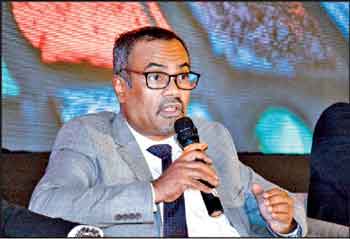Tuesday Feb 24, 2026
Tuesday Feb 24, 2026
Saturday, 15 November 2025 00:24 - - {{hitsCtrl.values.hits}}
 |
| Finance Deputy Minister Dr. Anil Jayantha Fernando - Pic by Upul Abayasekara |
By Charumini de Silva
Finance and Planning Deputy Minister Dr. Anil Jayantha Fernando said that the Budget 2026 was formulated on the principles of clean politics, inclusivity, and sustainable growth, aiming to strengthen investor confidence while ensuring no citizen is left behind in economic recovery.
Delivering the keynote address at the post-Budget discussion organised by EY Sri Lanka recently, he said the Government has maintained “clean politics” as a core principle in preparing the Budget 2026, which he described as essential to creating a conducive environment for investors and social stability.
Dr. Fernando said that the political sphere plays a decisive role in shaping the country’s economic direction, and that the current administration has upheld transparency and avoided conflicts of interest in governance.
“The political environment is crucial for maintaining a social contract that supports investment and confidence. This Budget, too, was framed under those same principles,” he said.
Highlighting the qualitative and inclusive nature of the Budget, the Deputy Minister urged stakeholders to look “beyond the numbers,” noting that even small allocations in social protection and welfare programs are designed to ensure that “no one is left behind.”
He said the Budget 2026 is woven around six key strategic objectives; achieving medium-term growth above 7%, ensuring inclusivity and sustainability, strengthening the external sector, promoting a production-based economy, driving digitalisation, and building a skilled and adaptable human resource base.
The Deputy Minister highlighted the importance of promoting local production, clarifying that the Government’s objective is not to restrict imports, but to encourage production that complements investment and industrial inputs.
On the external sector, Dr. Fernando stressed the need for greater export diversification in both products and destinations, as Sri Lanka has been reliant on the same export items for decades.
He also said the Government remains committed to debt sustainability, describing it as “a given situation that must be managed prudently within the existing framework.”
On the human capital front, he said that investments in education, vocational training, and health are intended to create a multi-skilled workforce capable of driving innovation and productivity.
He also noted that rural development forms a key part of the inclusivity agenda, with Rs. 25 billion allocated for grassroots-level programs under newly formed Community Development Councils, which will involve local residents and professionals in planning and implementation.
“Under the leadership of President Anura Kumara Dissanayake, we are now at a stage where stabilisation has been achieved. The next step is to move towards inclusive, sustainable growth where all citizens can share in the country’s prosperity,” he said.